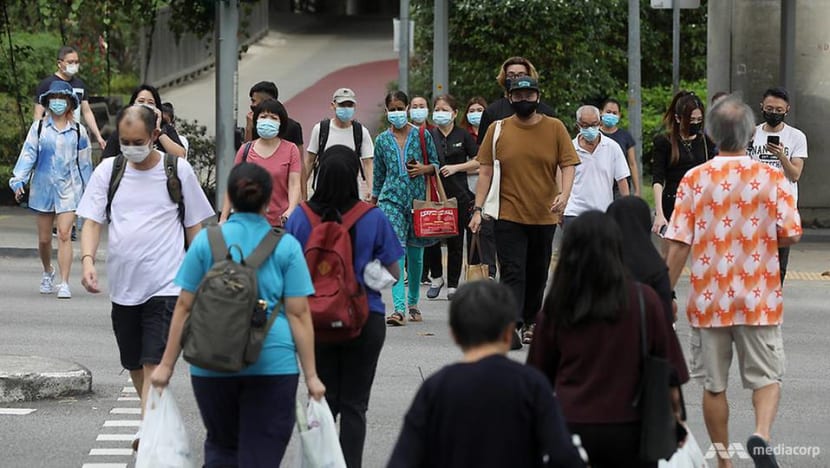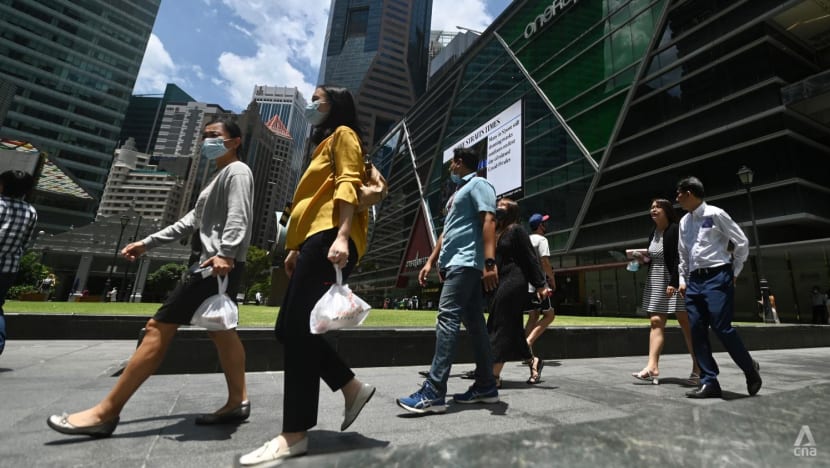Commentary: Three balancing acts for Singapore society as leadership transition looms
Social solidarity and collective responsibility, both highlighted in President Halimah Yacob’s address in parliament, will be crucial for Singapore to find the right balance in three areas, says the Institute of Policy Studies’ Gillian Koh.

SINGAPORE: Singapore society will have to deal with several balancing acts as it matures, amid the challenges arising from a changing world order, and a leadership transition in government.
President Halimah Yacob’s address at the start of the second session of the 14th Parliament on Monday (Apr 10), highlighted the strengths we can draw on to achieve that new equilibrium.
These are the social assets of trust, the enduring values of fairness, inclusion, derring-do and fiscal prudence in government, and a sense of collective responsibility - the basic notion that we do it better when we do it together.
But social solidarity is not a given. Singapore has shown we have a fairly robust supply of it as we travailed through the COVID-19 pandemic. The worry is that it can be depleted easily.
Maintaining this social solidarity means we have to balance what seem to be contradictory conditions or aspirations before us. This, with the ultimate aim of assuring everyone here that they can achieve progress in their lives; not the sense that their destinies are fixed in a strict pecking order of class or worse, that they will fall behind.
Will we achieve a virtuous cycle of growth with equity? Or do we face a toxic downward spiral into the politics of envy, tribalism and cynicism?
DEPENDABLE BUT AVOID DEPENDENCY
The first balancing act in the president’s address is this: We need to refresh this social compact - the responsibilities we owe to each other, between the state and people as well as among the people to meet key basic needs - but guard against breeding a dependency or entitlement mindset.
Of course, the government plays a central role in supporting people with education and skills training, uplifting the disadvantaged, and co-funding safety nets for the uncertainties in life.
In 2020, Prime Minister Lee Hsien Loong said that the government spent three times as much on social programmes every year than it did 15 years ago. During the exceptional conditions of a pandemic, S$40 billion from past reserves helped save lives and livelihoods, and provided subsistence to those who needed time to bounce back.
But what other measures of social support enable, not replace effort and self-reliance?
Budget 2023’s new Uplifting Employment Credit is emblematic of such a mechanism. By providing a wage offset, the government encourages employers to hire ex-offenders and reintegrate them into society through work. Or the existing Senior Employment Credit that similarly supports employers to help senior workers to extend their work lives.
Looking ahead to the government’s reform agenda under the Forward Singapore exercise, there is some clamour for unemployment assistance for persons who lose their jobs in periods of economic disruption.
If some form of such assistance comes to pass, the method of providing a monthly allowance conditional on people reskilling for the next job, much like the SGUnited Job and Skills Programme introduced during the pandemic or the Workfare Training Subsidy, seems better as a hand-up rather than a hand-out.
COLLECTIVE SUPPORT TO ENABLE SELF-RELIANCE
The second balancing act is to encourage self-reliance and agency, yet also encourage stakeholders to help.
Although businesses are likely to face difficult times ahead, grappling with recovery from the pandemic and an uncertain global economic outlook, paradoxically, they should do more, not less, for workers. A pro-worker ethos feeds a pro-work one which benefits businesses big and small, foreign and local.
In the 2023 Edelman Trust Barometer, a large majority of respondents in Singapore said they expected business leaders to "take a public stand" on social issues, such as the treatment of employees (87 per cent), discrimination (76 per cent), and the wealth gap (75 per cent).
Businesses must “do their part to invest in their workers”, said Mdm Halimah. The government is planning to introduce legislation to penalise workplace discrimination this year. We bear in mind that our corporate citizens are also absorbing the rise in Goods and Services Tax to fund the expansion of the government’s social policies, the increase in Central Provident Fund contributions to improve the retirement adequacy of older workers, and the expansion of the Progressive Wage Model to improve the wage and career prospects of workers.
In light of this, workers too should feel motivated to raise their value-add to keep firm-labour relations mutually beneficial.

BROADENING MERITOCRACY TO PROMOTE THE SUCCESS OF MANY OTHERS
The third balancing act is also the most important one for Singapore: We are a meritocracy, but those who have done well must give back and ensure the system remains broad and open.
We celebrate well-earned achievements, but we must be watchful of what entrenches the advantages of wealth, sets up roadblocks to social mobility, and breeds arrogance and social tension.
Consider - what if platform workers or those who take on informal work could access other jobs by demonstrating an aptitude for a task, not a university certificate? Can employers and human resource practitioners design smarter recruitment and assessment strategies to get more people into regular, permanent work? This, even as the government is helping people get certified for skills acquisition.
Think of the undergraduates who are the first to attend university in their families. If aptitude but also the “proven right work experience” are needed to get good jobs when they graduate, how will they get those plum internships? Who can lend them the “right connections” they lack? Can they afford the opportunity cost of not taking better paid but unrelated work instead?
REINVESTING IN THE SOCIO-POLITICAL ROOTS OF SINGAPORE’S SUCCESS
With more fourth-generation political leaders taking their place in government and Deputy Prime Minister Lawrence Wong heading the Forward Singapore initiative in six pillars of action, we are expecting paradigm shifts in how to foster the compassionate, inclusive, prosperous, and forward-thinking Singapore our pioneer leaders envisioned.
Building on the earlier Singapore Together approach to collaborative governance, there is fresh impetus in this direction, with small groups of individuals from different sectors working in partnership on those six areas to co-create the future Singapore we wish to become.
One example is a new ground-up initiative to crowd-in contributions of time, resources, and networks from the growing community of family offices and high-net-worth individuals to address key social and environmental needs in Singapore and the region.
In his 2017 lecture series as the Institute of Policy Studies’ S R Nathan Fellow, Mr Lim Siong Guan said that societies rise from poverty by getting the economics right, but they decline when they get society wrong. Fights over what is a fair share of that wealth arise which are corrosive and benefit no one.
In her address, the President reminds us to nurture a sense of shared wealth by articulating and acting on our uncommon ethos of collective responsibility and egalitarianism instead.
As a good Chinese proverb puts it, when you eat the fruit, remember the trees that produced them; when you drink water, think of its source. When we are grateful for the success and resources we have, we must also recognise the processes and culture behind these.
In the fine balance across interests, among stakeholders, and within new operating conditions, we can then generate fresh sources of abundance and strength for more who call Singapore “home”.
Dr Gillian Koh is Deputy Director (Research) at the Institute of Policy Studies, National University of Singapore.





















